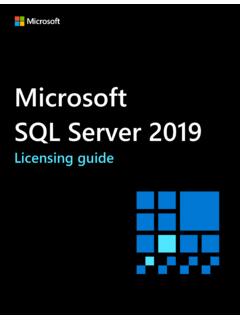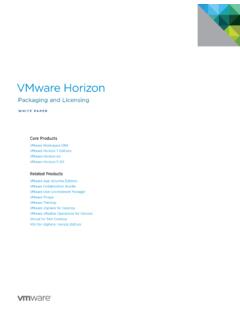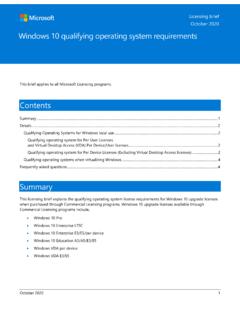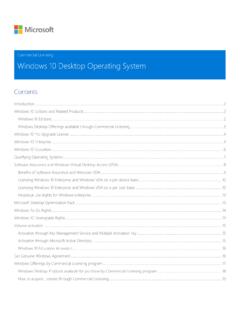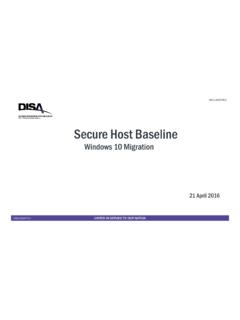Transcription of Licensing the Windows Desktop for VDI Environments
1 Licensing the Windows Desktop for VDI Environments Microsoft VDI and Windows VDA Frequently Asked QuestionsHow does Microsoft license the Windows Desktop for virtual Environments ? Microsoft licenses Windows for virtual desktops by access device: Virtual Desktop access rights are a benefit of Windows Client Software Assurance (SA). Customers who intend to use PCs covered under SA have access to their Virtual Desktop Infrastruc-ture (VDI) desktops at no additional charge. Customers who want to use devices that do not qualify for Windows Client SA, such as thin clients, will need to license those devices with Windows Virtual Desktop Access (VDA) in order to access a Windows VDI Desktop . Windows VDA is also applicable to third party devices, such as contractor or employee-owned is Windows Virtual Desktop Access (VDA)? Windows VDA is a device based subscription designed to help organizations license devices that do not qualify for Windows Client SA, such as thin clients and contractor-owned PCs, so these devices can access a virtual Desktop .
2 Windows VDA is available for $100 / year / device through all major Microsoft Volume Licensing (VL) programs. Pricing is retail pricing in USD, and prices may vary depending on your location and agreement with Microsoft. Microsoft reserves the right to change prices at any time. What if I intend to use my PCs to access my VDI environment? Do I still need Windows VDA? As of July 1st, 2010, the rights to access virtual desktops have been included as a benefit of Windows Software Assurance. Hence, if you intend to use PCs already covered with SA to access your VDI environment, no additional Licensing is required. However, if your PCs are not covered under SA, contact your Microsoft representative to understand how to get SA for those PCs, so you can avail of the virtual Desktop access rights through Software Assurance do you calculate the number of Windows VDA licenses required? Since Windows VDA is based on the number of access devices, the total number of Windows VDA licenses required equals the total number of thin clients and other non-SA devices that will access the VDI Windows Client SA / Windows VDA provide me any Licensing rights for applications?
3 No, Windows Client SA / Windows VDA only provides Licensing rights for the Windows client operating system (OS) itself. Please consult with your application vendor to understand application use rights and Licensing for virtual Environments . In order to access Microsoft Office in a virtual machine (VM), each device accessing Microsoft Office needs the corresponding license for much does Windows VDA cost?At retail, Windows VDA costs $100 / year / device. Pricing is retail pricing in USD, and prices may vary depending on your location and agreement with Microsoft. Microsoft reserves the right to change prices at any m buying VDI software from VMware / Citrix / another vendor. Do I still need Windows VDA? Yes. If you are accessing a Windows client OS as your guest operat-ing system in the datacenter from any non-SA device (including thin clients, iPads, etc), Windows VDA is the appropriate Licensing vehicle regardless of the VDI software vendor you choose.
4 The only scenario where you would not need Windows VDA is if you were using PCs covered under Software Assurance as the access devices, since virtual Desktop access rights are included as a benefit of 2012 What benefits does Windows VDA provide? OR What does my Windows VDA subscription include? Windows VDA delivers a number of benefits: Access Windows 7, Windows Vista , or Windows XP on virtual machines on any combination of hardware and storage Unlimited movement between servers and storage Access corporate Desktop images from non-corporate PCs The primary user of a Windows VDA device has extended roaming rights, so they can access their VDI Desktop while roaming outside of the corporate domain from any non-corpo-rate device, such as a home PC or Internet kiosk Includes Software Assurance benefits, such as 24x7 call support, training vouchers, access to Enterprise versions of Windows , etc. Eligibility for other Software Assurance products, such as Micro-soft Desktop Optimization Pack (MDOP) purchase rights and Windows Thin PC Single Windows VDA license allows concurrent access for up to four virtual machines Reassignment rights to another device after 90 days, or in the case of endpoint failure Dynamic Desktop Licensing enabled through KMS/MAK activation Unlimited backups of both running and stored virtual machinesWhy is Windows VDA subscription only?
5 The optimal model for Licensing software-as-a-service is the subscription model. Because Windows VDA lets you deliver desk-tops-as-a-service, Microsoft uses subscription pricing for it. This keeps Windows VDA consistent with the Software Assurance subscription for delivering the same benefit to do not want to pay a subscription. Can I purchase Windows VDA outright? No, you cannot purchase Windows VDA outright. It is only available as a I use Windows FPP (retail licenses) to support my VDI implementations instead of Windows VDA? Windows VDA has been designed specifically for VDI scenarios. Full package product (FPP) licenses obtained through the retail channel for Windows Desktop operating systems, such as Windows 7 Professional, Windows Vista Business, and Windows XP Professional were not designed for a VDI scenario, but may be used for VDI in the following situations: The physical server on which the virtual Desktop is installed is assigned only to one user, and is not shared with other VDI desktops .
6 Microsoft does not recommend this configuration for VDI, as it would lead to increased costs of your virtual environment. In a standard VDI environment where multiple users need access to VMs running on the same server, the access device being used to remote into the VDI Desktop is a PC that is licensed with the same version of Windows as the FPP VM. However, customers using Windows -based devices to access virtual desktops can alternatively acquire Software Assurance coverage on those devices with a VL upgrade at a much lower cost, and hence avail of virtual Desktop benefits without the need to purchase FPP, while getting all of the other benefits of Microsoft Software Assur-ance at the same time. The following restrictions on FPP Licensing apply to VDI scenarios: Each FPP license permits use of only a single VM per user. Hence, each VM needs its own licensed copy of Windows for VDI. For users who need access to multiple VMs, this may prove expensive.
7 Multiple simultaneous users cannot share VMs, as each VM licensed with an FPP copy of Windows needs to be assigned to one user at a time. The FPP licensed VM can only exist on a single computer at any given time. If you have to move the VM to another server, it has to be completely moved off the original machine. Since the access device needs to be licensed with the same version of Windows as the FPP VM, this effectively leads to two desktops with the same OS version, thereby not offering any distinct productivity gains or cost savings compared to just running the FPP on the PC. With VDA, customers gain the following advantages over FPP:1. Access to all SA benefits for their covered VDI desktops 2. Opportunity to purchase MDOP and use Windows Thin PC3. Ability to access multiple VMs from a single licensed device, and the ability to run up to four VMs concurrently 4. Access to their VDI desktops from other non-corporate devices, such as a home PC or Internet kiosk Hence, for customers using non-qualified SA devices, including thin clients, to access their VDI environment, Windows VDA is the only appropriate license for the scenario.
8 Note: Windows 7 Professional, Windows Vista Business, or Windows XP Professional obtained through VL upgrade, when purchased on top of a qualifying operating system license, has all the limitations of an FPP license, as well as the added limitation of not being allowed to move off the device on which the OS is first installed. This means the VM cannot be dynamically moved across servers, thereby not allowing business continuity and load balancing scenarios, and negating the advantages of VDI and Windows VDA Frequently Asked QuestionsDo I need to pay for Windows VDA if I use Windows Server as a client operating system in my virtual machine? OR I ve heard that I can avoid paying for Windows VDA by using Windows Server as my VDI Desktop OS ( run Windows Server OS in a VM as my primary Desktop ). Is this true? Running a Windows Server OS within a VM in a VDI scenario does not require Windows VDA, but there are many reasons why you should use a Windows client OS as your VDI Desktop : The user experience with a server OS as the Desktop is different from using a Windows client OS Many applications for end users were written for a client OS and not a server OS.
9 Each of your applications would need to be retested to ensure compatibility with a server OS. Additionally, most vendors do not offer support for client applications running on servers. Clients and servers are on different patch cycles, adding to management complexity. Most of the VDI ecosystem will support the Windows client in the datacenter, not server operating systems. However, if you do decide to deploy a dedicated Windows Server OS within the VM for every user as their VDI Desktop , please note that you will need to purchase an RDS-CAL ( Windows Server 2008 R2 Remote Desktop Services Client Access License) to correctly license that Windows VDA a device-based or user-based license? OR Can I pay for Windows VDA per user? Windows VDA is licensed per access device. There is currently no option to license Windows VDA per user. However, the extended roaming benefit allows the primary user of a Windows VDA device to access their VDI Desktop from any non-corporate device outside of the corporate network, thereby providing tremendous I have a single Windows VDA license for a device, how many different VDI desktops can I connect to at once?
10 One Windows VDA license entitles the device to connect to up to four VMs you explain the extended roaming rights in Windows VDA? The primary user of a VDA licensed device at work can access their VDI Desktop from any device that is not owned or affiliated with the user s organization, without the need for an additional Windows VDA license. This enables VDI users to access their secure corporate desktops through an unmanaged device such as a home PC or an Internet kiosk, without the need for a laptop. However, if the user does not have a primary VDA device a work, and needs to access his VDI Desktop from a non-corporate device such as a home PC, then that device would need to be covered with a separate Windows VDA license. Roaming rights are only applicable while roaming outside of the corporate domain, hence any device accessing a Windows virtual Desktop within the corporate domain needs to be licensed with either Windows Client SA or Windows I access my Microsoft Office applications (such as Outlook and Word) while roaming?

